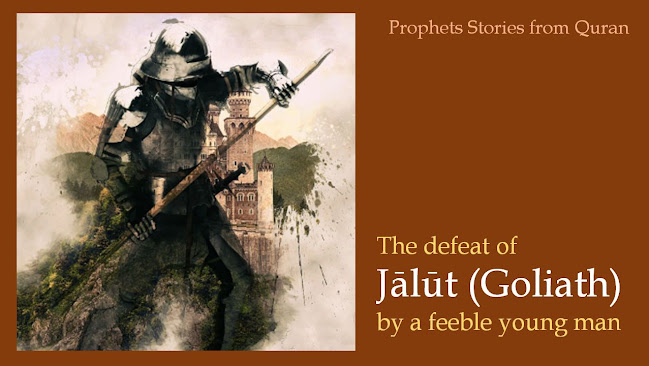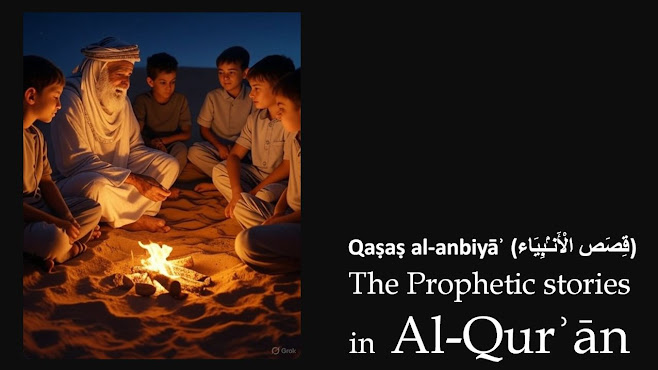In the Qur’an, Ṭālūt (Taloot) and Jālūt (Jalut) refer to two historical figures in a pivotal battle involving Bani Israel. It was the face off between the small army of Ṭālūt, referred to the King Saul who lived about 3,000 years ago and was the first Israelite king, when the mighty power of Jālūt, known as the Goliath, was not only defeated but Jālūt was also killed by a feeble young man with his hand held sling. Who was this young man and who he became after his heroic feat on the battlefield? Let us go back into history and find out.
Who was Ṭālūt and who was Jālūt?
Ṭālūt is the Qur’ānic name for King Saul, appointed by Prophet Samuel as king over the Israelites, chosen not for wealth or lineage but for knowledge and physical stature. While Jālūt corresponds to Goliath, the giant warrior leading the opposing army. He is known for his height, strength, and tyranny.
The Story as Retold in the Qur’an (Surah Al‑Baqarah, verses 246–251)
Al Qur'an briefly describes the appointment of Talut as king and narrates how the army of true believers led by Talut defeated the far mightier Philistine army of Jalut (Goliath) that worshiped false deities. The effective leadership of Talut, and later, the exceptional bravery of a young man, led to an unlikely victory for the Israelites and laid the foundation for the golden period in the history of the tribe.
- Demand for a King and Appointment of Ṭālūt:
- After Musa’s passing, the Israelites asked to appoint a king to lead them in battle. God designated Ṭālūt, despite their objections: “How can he be king over us when some of us are more worthy and he lacks great wealth?”
- Their prophet said: “Allah chose him and increased him in knowledge and stature.” (Qur’an 2:247)
- Miraculous Sign — The Return of the Ark (Tabūt)
- To confirm his appointment, God returned the Ark of the Covenant—once lost during tyranny—to the Israelites, carried by angels.
- “The sign of his authority is that the Ark shall come to you... in it is peace from your Lord...” (Qur’an 2:248)
- The Test at the River
- Before battle, Ṭālūt tested the loyalty of his army by forbidding them to drink excessively from a river: “Whoever drinks from it is not of me, except those who take only a handful...”
- Only the disciplined few passed the test.
- The Battle and Victory
- Ṭālūt’s faithful army, though smaller, faced Jālūt’s vast forces.
- The believers prayed: “Our Lord! Send patience upon us and make us firm and grant us victory over the disbelieving people.”
- By God's will, they triumphed, and a feeble young man Dāwūd (later Prophet David) dared the mighty monster Jālūt and killed him a forceful throw of a stone from his hand held sling, causing the enemy army to flee the battlefield.
Ṭālūt had promised whoever killed Jālūt would marry his daughter and share his rule. So it was young Dawood who killed the unbeatable mighty monster received kingship as a reward and divine wisdom thereafter. Prophet Dawood is one of the few Prophets who received Kingship as well.
- For his steadfastness and faithfulness, Prophet Dawood was given the Divine scripture of Psalms as mentioned in Qur'an: (17:55) Your Lord knows all who dwell in the heavens and the earth. We have exalted some Prophets over others, and We gave the Psalms to David.
- For the story of the prophet David (peace be upon him), please refer to (Surah Al-Baqarah, Ayat 251); (Surah Bani-Israil, Ayat 55); (Surah Al-Anbiya, Ayats 78-81); (Surah An-Naml, Ayat 15)
- He was also gifted with a son Sulaiman, who later rose to be the Prophet Solomon, gifted with countless bounties by Allah.
Key Themes & Lessons
Following are some of the lessons that we learn from the encounter between Dawood, later Prophet David, and Jālūt:
- Divine appointment: God appoints leaders based on character and wisdom, not status.
- Trial & discipline: True commitment is tested; only a few remain steadfast under hardship.
- Faith over numbers: Victory often comes through faith, not sheer force or majority.
- Humility in success: Dawood remained humble despite prominence and divine gifts.
I came across of a video about Prophet Dawood and Goliath and thought of sharing here being appropriate and graphical to explain what all has been written above:
The story of Ṭālūt and Jālūt, while historical, offers timeless lessons: leadership by merit, resilience in trials, humility in power, and the power of faith to overcome seemingly insurmountable odds.
Please refer to our exclusive reference page: The Prophetic stories, Qaṣaṣ al-anbiyāʾ (قِصَص الْأَنـۢبِيَاء), mentioned in Al-Qurʾān for more prophetic stories mentioned in Al Qur'an.
You make like to refer to our reference page: Understanding Al-Qurʾān to learn Al-Qurʾān better. For more Q&A about Understanding Islam, please refer to our reference page: Understanding Islam - Frequently asked Q&A
If you like Islam: My Ultimate Decision, and to keep yourself updated on all our latest posts to know more about Islam, follow us on Facebook
Follow @IslamUltimate
Please share this page to your friends and family members through Facebook, WhatsApp or any means on Social Media so that they can also be benefited by it and better understand Islam and the Holy Qur'an - Insha Allah (Allah Willing) you shall be blessed with the best of both worlds.




















